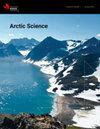Water quality parameters and constituent concentrations measured in the Peel and Arctic Red Rivers, 2007-2010.
IF 3.2
3区 地球科学
Q2 ECOLOGY
引用次数: 0
Abstract
Outflow from north-flowing circumpolar rivers has a strong influence on the Arctic Ocean. The Peel and Arctic Red Rivers are tributaries of the Mackenzie Delta, a large, lake-rich floodplain that forms the interface between the Mackenzie River and the Beaufort Sea basin of the Arctic Ocean. Here, we present water quality data that were collected from the Peel and Arctic Red Rivers between 2007 and 2010 as part of an International Polar Year project that investigated the seasonal hydrology and biogeochemistry of the Mackenzie River and its delta. The Peel River was sampled 57 times between May 2007 and September 2010 upstream of the community of Fort McPherson, NT, while the Arctic Red River was sampled 32 times between May 2007 and August 2008 (with one additional sample in June 2010) approximately 0.5 km upstream of its confluence with the Mackenzie River near the community of Tsiigehtchic, NT. Each water sample was analyzed for up to 22 water quality parameters, including water temperature, specific conductivity, pH, chlorophyll-a, total suspended sediments, particulate nutrients (carbon, nitrogen, and phosphorus), soluble reactive silica, major ions (calcium, magnesium, potassium, sodium, chloride, and sulfate), dissolved carbon (inorganic and organic fractions), and dissolved nutrients (three nitrogen and two phosphorus fractions). This dataset, which is available for download and reuse, provides important baseline information about water quality in the Peel and Arctic Red Rivers, complements other data that have been collected in these watersheds, and will be of interest to researchers, resource managers, Indigenous organizations, and governments that are active in the region2007-2010年皮尔河和北极红河水质参数和成分浓度测量。
北流的环极河流的流出对北冰洋有强烈的影响。皮尔河和北极红河是麦肯齐三角洲的支流,麦肯齐三角洲是一个巨大的、湖泊丰富的泛滥平原,形成了麦肯齐河和北冰洋波弗特海盆地之间的界面。在这里,我们展示了2007年至2010年间从皮尔河和北极红河收集的水质数据,作为国际极地年项目的一部分,该项目调查了麦肯齐河及其三角洲的季节性水文和生物地球化学。2007年5月至2010年9月,皮尔河在北部麦克弗森堡社区上游进行了57次采样,而北极红河在2007年5月至2008年8月期间(2010年6月进行了一次额外采样)在北部Tsiigehtchic社区附近与麦肯齐河汇合处上游约0.5公里处进行了32次采样。每个水样都被分析了多达22个水质参数,包括水温、比电导率、pH值、叶绿素-a、总悬浮沉积物、颗粒营养物(碳、氮、磷)、可溶性活性二氧化硅、主要离子(钙、镁、钾、钠、氯化物和硫酸盐)、溶解碳(无机和有机组分)和溶解营养物(三氮两磷组分)。该数据集可供下载和重复使用,提供了关于皮尔河和北极红河水质的重要基线信息,补充了在这些流域收集的其他数据,并将对研究人员,资源管理者,土著组织和活跃在该地区的政府感兴趣
本文章由计算机程序翻译,如有差异,请以英文原文为准。
求助全文
约1分钟内获得全文
求助全文
来源期刊

Arctic Science
Agricultural and Biological Sciences-General Agricultural and Biological Sciences
CiteScore
5.00
自引率
12.10%
发文量
81
期刊介绍:
Arctic Science is an interdisciplinary journal that publishes original peer-reviewed research from all areas of natural science and applied science & engineering related to northern Polar Regions. The focus on basic and applied science includes the traditional knowledge and observations of the indigenous peoples of the region as well as cutting-edge developments in biological, chemical, physical and engineering science in all northern environments. Reports on interdisciplinary research are encouraged. Special issues and sections dealing with important issues in northern polar science are also considered.
 求助内容:
求助内容: 应助结果提醒方式:
应助结果提醒方式:


